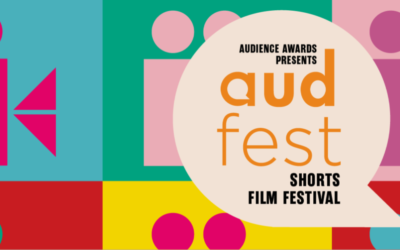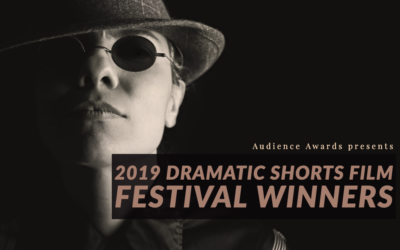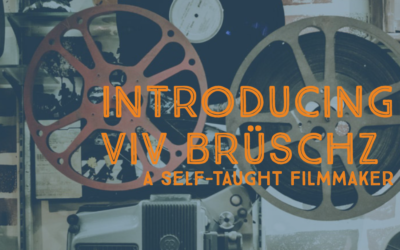“When I can tell people’s stories in a way that resonates, that’s one of the greatest feelings in the world.”
Ethan Rocke is the director of the film Four Letters, which is competing in the Audience Awards’ LGBTQ short film competition. Along with being a documentary filmmaker, Rocke is also a freelance journalist. He employs innovative forms of storytelling using multimedia, photography and journalism to interpret the complexities of the human condition. In an interview with Rocke, he discusses his current project and the digital platforms that broaden the scope of traditional journalism.
Q: What gets you fired up about making films?
A: I thrive on the human connections you make as a journalist and documentary filmmaker. Telling other people’s stories is something I take very seriously, and when I can tell people’s stories in a way that resonates – in a way that allows others to better understand our human condition – that’s one of the greatest feelings in the world. I’m also inspired to tell stories that give a voice to the voiceless. That’s one of the most important functions of journalism, I think.
Q: Tell us about your current film project.
A: I’m currently working on an interactive web presentation (think New York Times’ Snowfall) about a legendary Marine Corps officer named James Capers Jr., who was nominated for the Medal of Honor in 2008 for his actions in Vietnam in 1966-67. Despite strong endorsements from three generals and the men Capers served with, the recommendation was downgraded two levels at the Pentagon. Had Capers received the Medal, he would have become the first black Marine Corps officer to receive the nation’s highest military honor. My story focuses on the emotional turmoil Capers endured during the Medal of Honor process and afterward as he had to deal with the feelings of rejection, the loss of his wife to cancer and the tragic loss of a close friend whose PTSD led to his death in 2012.
Q: How did you come across the story of Nicola and Meg that is the basis for your film Four Letters?
Four Letters was produced during the Portland (Multimedia) Workshop last summer. The Portland Workshop was developed by the University of Oregon’s School of Journalism and Communications, and I attended as a graduate student in the UO’s Multimedia Journalism program. I was tasked with finding a story for my team before the workshop, so I reached out to the staff at Basic Rights Oregon, asking what types of LGBT issues they were championing. After trading a few emails with one of their media liaisons, I knew I wanted to tell Meg and Nicola’s story. BRO connected me with the Cowies, and we hit if off immediately. My team consisted of me, a very talented undergraduate student named Tess Freeman and our coach, Carey Wagner, a freelance journalist and filmmaker based in New York City. The Cowies let us into their lives for three days of shooting, and then I spent a couple weeks holed up in my house just constantly editing until the film was done.
Q: Tell us 3 things you most like to do in your free time.
1. Spend quality time with my wife and kids, especially anything involving getting outside and experiencing Oregon’s incredible natural beauty.
2. I’m a media junky, so I enjoy binge-watching shows on Netflix, watching movies and sports, and reading and writing literary fiction. I also have a masochistic relationship with Facebook and the hyperbolic political discussions that often break out on my page.
3. I also love running and playing basketball and am constantly trying to strike a better balance with those activities and my media-junky tendencies.
Q: What do you most like about the Audience Awards’ LGBTQ Short Film Competition?
A: I love that this is a sort of people’s-choice thing. It makes it kind of fun because promoting our films through our own networks is a vital element to getting the votes needed to win. And as a starving freelancer, I’m also a big fan of the $1000 prize I’d get if I win.
Q: Who inspires you in the film industry?
A: Wow. So many people. Where to begin? How about I just name a few who I’m really into right now. Darren Aronofsky and David Fincher are filmmakers whose work I really love. I generally love almost everything the Coen brothers have ever done. Spike Jonze’s “Her” was probably my favorite film from last year because it mixed two of my favorite things: romance and futurism. The visual style and pretty much everything about that film is absolutely brilliant. Also, Quentin Tarantino is a genius.
Q: Are there any entertainment trends that you’re addicted to right now?
A: I have a couple trends I’m currently in love with. As someone who loves literary journalism and films, I’m really excited by those digital platforms that are trying to carve out a new market for this emerging form I’ll call “multimedia long-form.” The best example I know of is The Atavist. The type of long-form/multimedia fusion they’re championing at The Atavist is pretty awesome, and I hope more outlets will emerge with a similar format.
Now this part is going to sound cliché, but I think the most exciting stuff happening in film right now is happening on television or the Internet. There’s a lot of buzz these days about the “television renaissance” that’s happening, and I think that’s a pretty apt term. Specifically, I’m a big fan of the types of shows being produced by outlets such as HBO, AMC and Netflix. I’ve always been attracted to subversive media narratives – stuff that kind of undermines western conventions, and I think there’s a lot of that on TV and on Netflix right now. The characters we’re falling in love with on TV today are often these postmodern anti-heroes whose notions of good and evil are far removed from the American mainstream. The fact that those types of narratives have become not only marketable but wildly successful is pretty exciting for me as a storyteller and filmmaker.
Watch Rocke’s film Four Letters or visit his website.
Don’t forget to vote for your favorite LGBTQ short film here.




